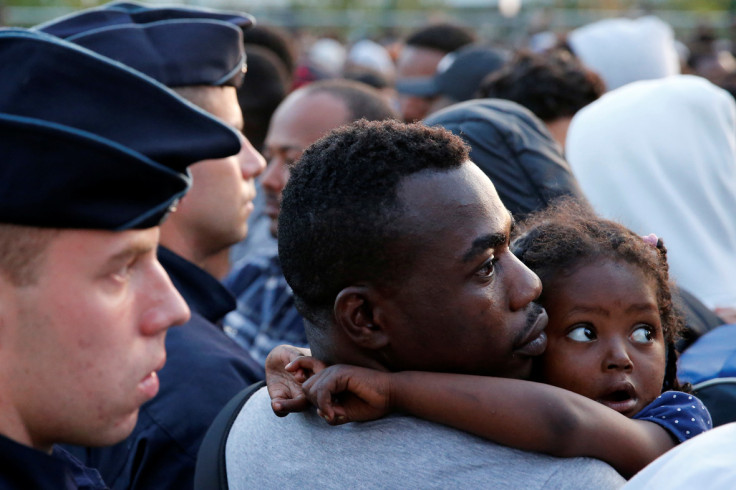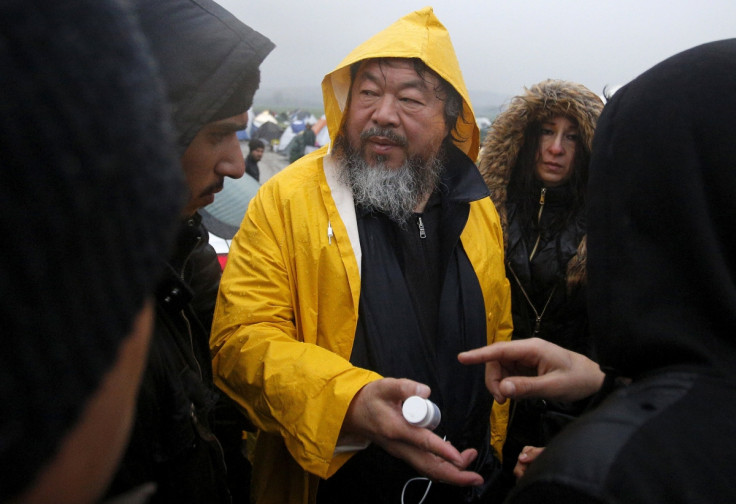Ai Weiwei's extraordinary film about refugees is a call to action we cannot ignore
The impact of Chinese artist Ai Weiwei's latest filmic work is like a physical blow to the heart.
This week I went to a film premiere with no flashing lights, no red carpet, no female stars in revealing frocks, no shrieking fans, no selfies. Famous folk turned up, dressed down.
Excellent canapes and champagne were guzzled at the reception but the mood was apprehensive. We knew we were going to be emotionally shaken and visually vanquished, that the filmmaker would draw us out of our comfortable habitats and routine thought patterns. That's what he always does.
The provocative and renowned Chinese artist, Ai Weiwei, is perhaps best known in Britain for filling Tate Modern's huge turbine hall with millions of ceramic sunflower seeds. His latest work is a feature film, Human Flow, about 21st century refugees. It is a biblical epic, an unheard prayer and political shoutout.
I went up to the artist, perhaps a bit too deferentially. Weiwei is like a gentle prophet. We spoke about displaced peoples without homes, names, identities, futures. I told him I too was banished from my birthland and he listened attentively.
There have been countless documentaries about today's refugees. The impact of this one is like a physical blow to the heart. Some drone filmed footage shows small insect-like creatures thrashing around in unclean waters. Then you see they are people. You notice that the children don't cry, but grown men do as they hold up placards with words such as 'Respect' and 'Human'.
Weiwei starts in Lesbos, Greece, where this idea first came to him when we was on holiday with his son and girlfriend: "You are on this beautiful beach and then you see a dinghy boat, peacefully approaching the port right in front of us. I turned on my iPhone camera and started filming. What I saw was shocking and unbelievable – a baby being handed out (of the dinghy), women climbing out...
"I started to hear their stories. They had to walk 70 hours to reach the point where they can register. They sleep on the road. They are sitting in the rain. That made me so curious. They (the refugees) are proud people. They have dignity. They're not beggars."
He went on filming in 23 countries - Gaza, Eastern Turkey, Bangladesh, across the Middle East.
Weiwei does not speak to camera, only to the refugees. In an interview he explained: "We may speak totally different languages and have totally different belief systems but I understand them. Like me, they are also afraid of the cold and don't like standing in the rain or being hungry. Like me, they need a sense of security."
He tries to absorb their pain, cuts their hair, holds buckets as they vomit, shares their food. There is stoicism and laughter. Someone makes a socket board so mobile phones can be charged; a woman shows a picture of her kitten dressed in a jumper back in Syria.

Around 65 million people are on the move, the highest number since the Second World War. Uganda, my old country, is extraordinarily generous and gives small plots of land to escapees from the conflict zones of Sudan.
Bangladesh is having to shelter over a million Rohingya Muslims fleeing Myanmar. Jordan, a country with few resources, makes sure millions of incomers have basics and are given choices and dignity. Germany took in a million refugees last year.
However, most other rich states are viciously turning on the helpless or using them as pawns. Turkey has been paid billions to keep refugees outside the EU. It has taken the money yet treats them abominably.
In Britain and Australia the desperate are seen as a threat. Ten people – including asylum seekers – have committed suicide in UK immigration detention centres this year. I know young girls who cut themselves or went mad in these prisons.
Australia keeps all those who arrive by boat in concentration camps on remote islands – their own Guantanamo Bay. A Kurdish poet Behrouz Boochani has been held there for four years. His diary records inmates being starved and beaten.
Post-war refugee protection treaties have been quietly discarded. They were the foundation documents for a civilised world. We have modern technology, incredible scientific progress but the world is becoming more barbaric, less human. If fed all the facts robots would behave better.
Go see this film. Get angry, very angry, not only with the leaders of countries which disgorge refugees, but Western governments which debase and discard global citizens who have to move in order to live. Racial and ethnic factors are playing out in this tragedy. Most refugees are dark skinned and from the east or south. No white Anglo-Saxons or Italians or Irishmen and women are today having to trek or sail away from real dangers.
When Prime Minister Theresa May and the Queen go to Christmas services, they should live their Christianity and give sanctuary to the truly needy. Let them remember Jesus was a baby refugee, with brown skin and dark eyes.

© Copyright IBTimes 2025. All rights reserved.






















